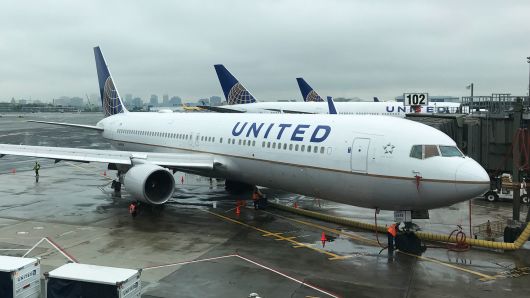
The biggest winner among U.S. airline stocks this year just got another boost.
Shares of United Continental Holdings, the parent of United Airlines, were trading about 6 percent higher in afternoon trading Wednesday after the carrier lifted its profit outlook for the third time this year and said it was able to offset a more than 30 percent increase in its fuel bill thanks to strong demand and higher airfares.
“As was the case in July, we’re struggling to find things to complain about, despite our most cantankerous efforts. With many investors having questioned whether [United’s] sector-trouncing equity outperformance might stall into year-end, we believe these results strongly suggest the contrary,” said J.P. Morgan Chase senior airline analyst Jamie Baker.
United expects to offset about 90 percent of the increase in fuel prices this year. Travelers are willing to pay up for more expensive seats, including those with more legroom and other perks, executives said on a call with analysts on Wednesday. The results quieted worries earlier in the year that United’s aggressive growth plan would lead to a fare war with other carriers.
The airline has found new ways to upsell travelers on more expensive seats. For example, United’s ancillary revenue — income beyond base airfare — was led by sales of so-called Economy Plus seats, which offer travelers a few additional inches of legroom and a seat closer to the front of the plane, said United’s chief commercial officer, Andrew Nocella. The surcharges for these seats vary but a round-trip ticket between Newark, New Jersey, and San Francisco in early November was about $445 in a regular economy class seat and $200 more in Economy Plus seats.
United, like other airlines, is in the process of segmenting its cabins into several classes of services, starting with restrictive basic economy fares. United’s version of the basic economy fare does not allow travelers to use overhead bins. American Airlines removed that restriction for its basic economy fares in September, bringing its product more in line with its rival Delta Air Lines. United has no plans to copy that move, said Nocella.
“It’s working as designed and it’s working full speed ahead with where we’re at,” he said.
Airlines haven’t been shy that the no-frills product is there to encourage travelers to pay a higher, more lenient fare instead. The San Francisco itinerary was $60 cheaper in basic economy than regular coach.
United’s shares are up more than 30 percent so far this year, an outlier among carriers that have largely struggled as investors fretted about fuel costs, generally big airlines’ second-largest expense after employee salaries. The NYSE Arca Airline Index, which tracks 15 carriers, is down more than 13 percent so far this year, while the S&P 500 is up more than 5 percent.
Recent airline reports could give the sector a lift.
Delta noted last week a sharp increase in demand, particularly for its premium seats such as those in business class, that is helping it offset higher fuel costs.
On Wednesday, Deutsche Bank upgraded Delta, whose shares are down more than 2 percent so far this year and American, whose shares are off more than 34 percent, to buy, citing solid travel demand from consumers and the recent stock slide as an “attractive entry point.”
Delta and American shares were each up by about 3 percent.
American Airlines reports its third-quarter earnings on Oct. 25.
